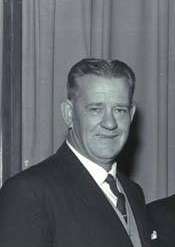Hugh Watt
| The Right Honourable Hugh Watt JP | |
|---|---|
 | |
| 5th Deputy Prime Minister of New Zealand | |
|
In office 8 December 1972 – 1 September 1974 | |
| Prime Minister | Norman Kirk |
| Preceded by | Robert Muldoon |
| Succeeded by | Bob Tizard |
| Constituency | Onehunga |
| Acting Prime Minister of New Zealand | |
|
In office 1 September 1974 – 6 September 1974 | |
| Preceded by | Norman Kirk † |
| Succeeded by | Bill Rowling |
| Personal details | |
| Born |
19 March 1912 Perth, Western Australia |
| Died |
4 February 1980 (aged 67) Auckland, New Zealand |
| Political party | Labour |
| Spouse(s) |
(1) Alice Merry Fowke (m. 1935; div 1965) (2) Irene Frances Watt |
| Children | 4 |
Hugh Watt PC (19 March 1912 – 4 February 1980) was a Labour member of Parliament and briefly the Interim Prime Minister of New Zealand between 1 and 6 September 1974 following the death of Norman Kirk.
He had been Deputy Prime Minister of New Zealand from 1972–1974.
Early life
Watt was Australian-born, like Labour Party founders such as Harry Holland, Michael Joseph Savage, Bob Semple and Paddy Webb and later MPs such as Mabel Howard and Clarence Skinner. He was born in Perth, Western Australia, in 1912, but emigrated to New Zealand with his family when he was a child. He attended Seddon Memorial Technical College, where he studied engineering, and established his own engineering business in 1947.[1]
Political career
| Parliament of New Zealand | ||||
| Years | Term | Electorate | Party | |
| 1953–1954 | 30th | Onehunga | Labour | |
| 1954–1957 | 31st | Onehunga | Labour | |
| 1957–1960 | 32nd | Onehunga | Labour | |
| 1960–1963 | 33rd | Onehunga | Labour | |
| 1963–1966 | 34th | Onehunga | Labour | |
| 1966–1969 | 35th | Onehunga | Labour | |
| 1969–1972 | 36th | Onehunga | Labour | |
| 1972–1975 | 37th | Onehunga | Labour | |
He stood unsuccessfully for Labour in Remuera in 1949 and in Parnell in 1951.[2] He then won Onehunga in a 1953 by-election after the death of Arthur Osborne, and held it to 1975. He retired at the 1975 general election in favour of Frank Rogers.[3]
Watt was first appointed as a minister in the Second Labour Government led by Walter Nash; he was Minister of Works (1957–1960) and Minister of Electricity (1958–1960).[4] During the Third Labour Government, in the ministry led by Norman Kirk, he was Minister of Labour (1972–1974) and Minister of Works and Development (1972–1974).[5]
Bill Rowling replaced Kirk as Prime Minister, although the party National Executive and the Federation of Labour preferred Watt.[6] In the Rowling ministry, he remained the portfolio of Works and Development, and was appointed to the Executive Council without portfolio.[7]
Watt was appointed New Zealand's High Commissioner to the United Kingdom effective from 22 March 1975 for three years. Controversially, he stayed on as a member of parliament and Cabinet Minister.[8] In June 1975, Watt was asked if he was about to resign as an MP. He stated that: "If I were to resign now as a Member of Parliament [for Onehunga] it would mean that I would lose my Cabinet status and the unique position that I have as High Commissioner with Executive Council rank that gives me access to British Government Ministers."[9]
Death
He died in 1980 in Auckland's Greenlane Hospital.[10]
Notes
- ↑ "Hugh Watt — politician of the people". New Zealand Herald. 6 February 1980. p. 14.
- ↑ Norton 1988, pp. 314, 331.
- ↑ Wilson 1985, p. 244.
- ↑ Wilson 1985, p. 88.
- ↑ Wilson 1985, p. 92.
- ↑ Auckland Star 5 September 1974 p11
- ↑ Wilson 1985, p. 93.
- ↑ Hay, John (22 February 1975). "New Zealand: Island unties apron strings". The Montreal Gazette. Retrieved 24 September 2014.
- ↑ The Evening Post 13 June 1975
- ↑ "Mr Rowling pays tribute to 'gentleman Hugh Watt'". New Zealand Herald. 6 February 1980. p. 3.
References
- Wilson, James Oakley (1985) [First ed. published 1913]. New Zealand Parliamentary Record, 1840–1984 (4th ed.). Wellington: V.R. Ward, Govt. Printer. OCLC 154283103.
- Hugh Watt profile via World Statesmen
- Norton, Clifford (1988). New Zealand Parliamentary Election Results 1946-1987: Occasional Publications No 1, Department of Political Science. Wellington: Victoria University of Wellington. ISBN 0-475-11200-8.
| New Zealand Parliament | ||
|---|---|---|
| Preceded by Arthur Osborne |
Member of Parliament for Onehunga 1953–1975 |
Succeeded by Frank Rogers |
| Political offices | ||
| Preceded by Robert Muldoon |
Deputy Prime Minister of New Zealand 1972–1974 |
Succeeded by Bob Tizard |
| Party political offices | ||
| Preceded by Fred Hackett |
Deputy-Leader of the Labour Party 1963–1974 |
Succeeded by Bob Tizard |
| Diplomatic posts | ||
| Preceded by Terry McCombs |
High Commissioner of New Zealand to the United Kingdom 1975–1976 |
Succeeded by Douglas Carter |